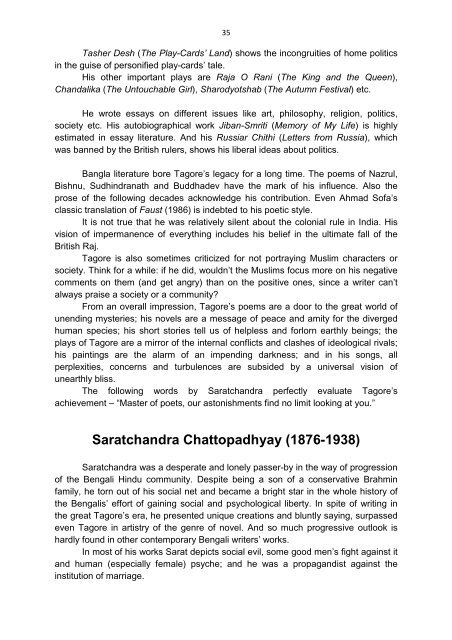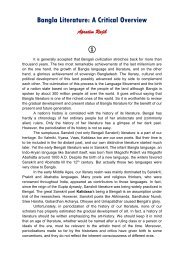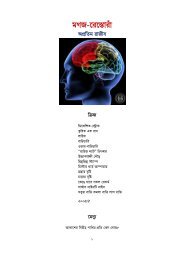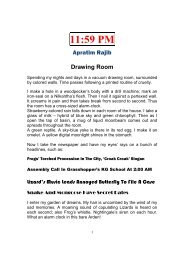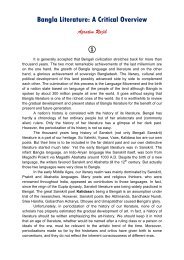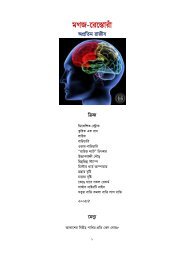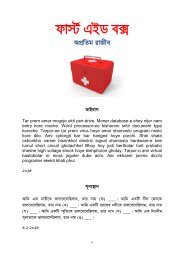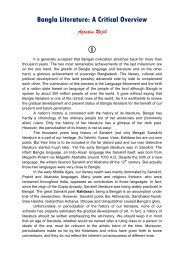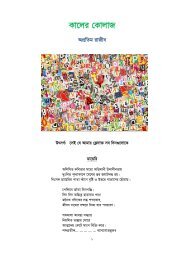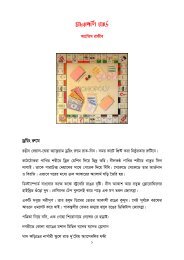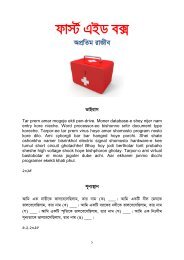BLiterature-Apratim
You also want an ePaper? Increase the reach of your titles
YUMPU automatically turns print PDFs into web optimized ePapers that Google loves.
35<br />
Tasher Desh (The Play-Cards’ Land) shows the incongruities of home politics<br />
in the guise of personified play-cards’ tale.<br />
His other important plays are Raja O Rani (The King and the Queen),<br />
Chandalika (The Untouchable Girl), Sharodyotshab (The Autumn Festival) etc.<br />
He wrote essays on different issues like art, philosophy, religion, politics,<br />
society etc. His autobiographical work Jiban-Smriti (Memory of My Life) is highly<br />
estimated in essay literature. And his Russiar Chithi (Letters from Russia), which<br />
was banned by the British rulers, shows his liberal ideas about politics.<br />
Bangla literature bore Tagore’s legacy for a long time. The poems of Nazrul,<br />
Bishnu, Sudhindranath and Buddhadev have the mark of his influence. Also the<br />
prose of the following decades acknowledge his contribution. Even Ahmad Sofa’s<br />
classic translation of Faust (1986) is indebted to his poetic style.<br />
It is not true that he was relatively silent about the colonial rule in India. His<br />
vision of impermanence of everything includes his belief in the ultimate fall of the<br />
British Raj.<br />
Tagore is also sometimes criticized for not portraying Muslim characters or<br />
society. Think for a while: if he did, wouldn’t the Muslims focus more on his negative<br />
comments on them (and get angry) than on the positive ones, since a writer can’t<br />
always praise a society or a community?<br />
From an overall impression, Tagore’s poems are a door to the great world of<br />
unending mysteries; his novels are a message of peace and amity for the diverged<br />
human species; his short stories tell us of helpless and forlorn earthly beings; the<br />
plays of Tagore are a mirror of the internal conflicts and clashes of ideological rivals;<br />
his paintings are the alarm of an impending darkness; and in his songs, all<br />
perplexities, concerns and turbulences are subsided by a universal vision of<br />
unearthly bliss.<br />
The following words by Saratchandra perfectly evaluate Tagore’s<br />
achievement – “Master of poets, our astonishments find no limit looking at you.”<br />
Saratchandra Chattopadhyay (1876-1938)<br />
Saratchandra was a desperate and lonely passer-by in the way of progression<br />
of the Bengali Hindu community. Despite being a son of a conservative Brahmin<br />
family, he torn out of his social net and became a bright star in the whole history of<br />
the Bengalis’ effort of gaining social and psychological liberty. In spite of writing in<br />
the great Tagore’s era, he presented unique creations and bluntly saying, surpassed<br />
even Tagore in artistry of the genre of novel. And so much progressive outlook is<br />
hardly found in other contemporary Bengali writers’ works.<br />
In most of his works Sarat depicts social evil, some good men’s fight against it<br />
and human (especially female) psyche; and he was a propagandist against the<br />
institution of marriage.


